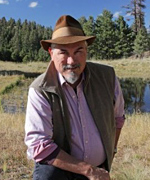 —Alan Dulaney
—Alan Dulaney
For several months, the Governor’s Water Discussion Group has been secretly discussing serious problems within the Arizona water world. “Secretly” is a misnomer, however, since everyone knew who was involved, the problems to be addressed, and what was going on. It’s in the newspapers. But the process is now exposing the hard truths of Arizona water.
The interests at the table mirror those that preceded the 1980 Groundwater Management Act —agriculture, cities, mines, tribes, developers, and even an occasional environmental NGO. Salt River Project is there. And of course, ADWR and the Central Arizona Water Conservation District (which runs the CAP canal) are arguing across the table. As the next legislative session gets closer, there is less dissembling about which proposals each interest will support.
A fundamental dynamic in the discussions has been the duel between ADWR and CAWCD over who is in charge of Colorado River actions. While not quite a shooting war, it is far more charged than any academic discussion. Here water is for fighting over.
Of the thirteen not-quite-final issues identified as suitable for legislative action, eight are associated with the Colorado River and the Drought Contingency Plan. ADWR and CAWCD strongly disagree on several. Foremost among them is tribal Intentionally Created Surplus; ADWR sees it as essential to the DCP, while CAWCD doesn’t accept that tribes can do it at all. Another bone of contention is what to do with excess water (undelivered amounts of Arizona’s 2.2 MAF allotment) and who makes the decision about this. CAWCD has specific statutory authority to control excess water but ADWR would like to use it for shoring up Lake Mead water level elevations. CAWCD claims sovereign immunity — the issue that publicly ignited the feud — but ADWR denies it. And the issue of CAWCD governance is a true hot button for all, as one proposal would have the ADWR director sit on the CAWCD board as a nonvoting member. And various sectors are beginning to choose sides, based on their own interests. Cracks are appearing in the Arizona foundation.
It’s time to face the elephant in the room.
Arizona must speak with one voice in the DCP negotiations to stave off a declared shortage on the Colorado River. The consensus amongst water interests that has held together for almost 40 years could unravel as the result of a power struggle, to the ruin of all. Only one voice can be allowed. Arizona needs the Colorado River, and it needs the regulatory framework that was first — and still best — in the nation.